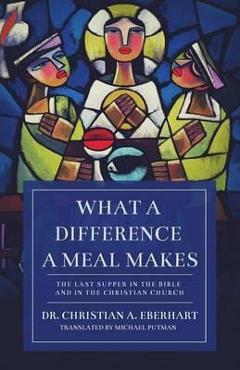What a Difference a Meal Makes: The Last Supper in the Bible and in the Christian Church - Christian Eberhart

Detalii What a Difference a Meal
libris.ro
126.4 Lei
140.45 Lei
Religion
Christian Eberhart
What a Difference a Meal - Disponibil la libris.ro
Pe YEO găsești What a Difference a Meal de la Christian Eberhart, în categoria Religion.
Indiferent de nevoile tale, What a Difference a Meal Makes: The Last Supper in the Bible and in the Christian Church - Christian Eberhart din categoria Religion îți poate aduce un echilibru perfect între calitate și preț, cu avantaje practice și moderne.
Preț: 126.4 Lei
Caracteristicile produsului What a Difference a Meal
- Brand: Christian Eberhart
- Categoria: Religion
- Magazin: libris.ro
- Ultima actualizare: 28-10-2025 01:22:05
Comandă What a Difference a Meal Online, Simplu și Rapid
Prin intermediul platformei YEO, poți comanda What a Difference a Meal de la libris.ro rapid și în siguranță. Bucură-te de o experiență de cumpărături online optimizată și descoperă cele mai bune oferte actualizate constant.
Descriere magazin:
Biblical scholar Christian Eberhart unpacks the words of institution of Christian communion services by explaining how first-century Christians would have understood This is my body, this is my blood. Using a conversational style, Professor Eberhart makes his extensive scholarship accessible to a non-academic audience. Readers will find their own experience of communion deepened after reading this book. Rev. Dr. Priscilla Eppinger, Professor of Religion, Community of Christ Seminary at Graceland University All Christians know that Jesus instituted a celebration with bread and wine. It has various different names, such as Last Supper, Lord\'s Supper, Communion, or Eucharist. Why do Christians today still participate in this celebration? What is its meaning? And what does it tell us about the ministry of Jesus Christ? This book answers these questions by looking closely at the foundational texts in the Bible. It is an invitation to first study relevant New Testament texts on the Last Supper of Jesus. From there the quest for meaning continues to the Old Testament where topics such as Passover, sacrificial rituals, and atonement are investigated. These texts offer decisive clues on how to comprehend forgiveness of sins that is effective during the Last Supper. Moreover, this book shows that the celebration which Jesus instituted was a ritualized meal. Therefore it explores social functions of communal meals in Greco-Roman antiquity. Thus the Last Supper emerges as a powerful symbol that is still relevant today, conveying the love of God and the ideal of an inclusive society.

Produse asemănătoare
Produse marca Christian Eberhart

What a Difference a Meal Makes: The Last Supper in the Bible and in the Christian Church - Christian Eberhart
![]() libris.ro
libris.ro
Actualizat in 28/10/2025
126.4 Lei